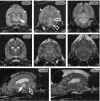L-2-hydroxyglutaric aciduria: characterisation of the molecular defect in a spontaneous canine model
- PMID: 17475916
- PMCID: PMC2597990
- DOI: 10.1136/jmg.2006.042507
L-2-hydroxyglutaric aciduria: characterisation of the molecular defect in a spontaneous canine model
Abstract
l-2-hydroxyglutaric aciduria (l-2-HGA) is a neurometabolic disorder that produces a variety of clinical neurological deficits, including psychomotor retardation, seizures and ataxia. The biochemical hallmark of l-2-HGA is the accumulation of l-2-hydroxyglutaric acid (l-2-HG) in cerebrospinal fluid, plasma and urine. Mutations within the gene L2HGDH (Entrez Gene ID 79944) on chromosome 14q22 encoding L-2-hydroxyglutaric acid dehydrogenase have recently been shown to cause l-2-HGA in humans. Using a candidate gene approach in an outbred pet dog population segregating l-2-HGA, the causal molecular defect was identified in the canine homologue of L2HGDH and characterised. DNA sequencing and pedigree analysis indicate a common founder effect in the canine model. The canine model shares many of the clinical and MRI features of the disease in humans and represents a valuable resource as a spontaneous model of l-2-HGA.
Conflict of interest statement
Competing interests: None declared.
Similar articles
-
Two novel L2HGDH mutations identified in a rare Chinese family with L-2-hydroxyglutaric aciduria.BMC Med Genet. 2018 Sep 14;19(1):167. doi: 10.1186/s12881-018-0675-9. BMC Med Genet. 2018. PMID: 30217188 Free PMC article.
-
L-2-hydroxyglutaric aciduria and brain tumors in children with mutations in the L2HGDH gene: neuroimaging findings.Neuropediatrics. 2008 Apr;39(2):119-22. doi: 10.1055/s-2008-1081217. Neuropediatrics. 2008. PMID: 18671189
-
Identification of novel L2HGDH gene mutations and update of the pathological spectrum.J Hum Genet. 2010 Jan;55(1):55-8. doi: 10.1038/jhg.2009.110. Epub 2009 Nov 13. J Hum Genet. 2010. PMID: 19911013
-
D-2-Hydroxyglutaric aciduria: unravelling the biochemical pathway and the genetic defect.J Inherit Metab Dis. 2006 Feb;29(1):21-9. doi: 10.1007/s10545-006-0317-9. J Inherit Metab Dis. 2006. PMID: 16601864 Review.
-
A novel compound heterozygous mutation of the L2HGDH gene in a Chinese boy with L-2-hydroxyglutaric aciduria: case report and literature review.Neurol Sci. 2018 Oct;39(10):1697-1703. doi: 10.1007/s10072-018-3483-2. Epub 2018 Jul 6. Neurol Sci. 2018. PMID: 29980873 Review.
Cited by
-
2-Hydroxyglutaric aciduria as a cause for seizure-like episodes in a domestic shorthair cat.JFMS Open Rep. 2019 Jun 18;5(1):2055116919853898. doi: 10.1177/2055116919853898. eCollection 2019 Jan-Jun. JFMS Open Rep. 2019. PMID: 31245020 Free PMC article.
-
A novel protein truncating mutation in L2HGDH causes L-2-hydroxyglutaric aciduria in a consanguineous Pakistani family.Metab Brain Dis. 2022 Jan;37(1):243-252. doi: 10.1007/s11011-021-00832-2. Epub 2021 Nov 1. Metab Brain Dis. 2022. PMID: 34719772 Free PMC article.
-
A novel missense variant in the L2HGDH gene in a cat with L-2-hydroxyglutaric aciduria and multicystic cerebral lesions.J Vet Intern Med. 2023 Mar;37(2):676-680. doi: 10.1111/jvim.16675. Epub 2023 Mar 7. J Vet Intern Med. 2023. PMID: 36880414 Free PMC article.
-
Pediatric seizure disorders in dogs and cats.Vet Clin North Am Small Anim Pract. 2014 Mar;44(2):275-301. doi: 10.1016/j.cvsm.2013.10.004. Epub 2013 Dec 5. Vet Clin North Am Small Anim Pract. 2014. PMID: 24580991 Free PMC article. Review.
-
An Overview of Canine Inherited Neurological Disorders with Known Causal Variants.Animals (Basel). 2023 Nov 18;13(22):3568. doi: 10.3390/ani13223568. Animals (Basel). 2023. PMID: 38003185 Free PMC article. Review.
References
-
- Topcu M, Aydin O F, Yalcinkaya C, Haliloglu G, Aysun S, Anlar B, Topaloglu H, Turanli G, Yalnizoglu D, Kesimer M, Coskun T. L‐2‐Hydroxyglutaric aciduria: a report of 29 patients. Turk J Pediatr 2005471–7. - PubMed
-
- Barth P G, Hoffmann G F, Jaeken J, Lehnert W, Hanefeld F, van Gennip A H, Duran M, Valk J, Schutgens R B H, Trefz F K, Reimann G, Hartung H‐P. L‐2‐hydroxyglutaric acidemia: a novel inherited neurometabolic disease. Ann Neurol 19923266–71. - PubMed
-
- Duran M, Kamerling J P, Bakker H D, van Gennip A H, Wadman S K. L‐2‐Hydroxyglutaric aciduria: an inborn error of metabolism? J Inherit Metab Dis 19803109–112. - PubMed
-
- Rzem R, Veiga‐da‐Cunha M, Noel G, Goffette S, Nassogne M C, Tabarki B, Scholler C, Marquardt T, Vikkula M, Van Schaftingen E. A gene encoding a putative FAD‐dependent L‐2‐hydroxyglutarate dehydrogenase is mutated in L‐2‐hydroxyglutaric aciduria. Proc Natl Acad Sci USA 200410116849–16854. - PMC - PubMed
-
- Rzem R, Van Schaftingen E, Veiga‐da‐Cunha M. The gene mutated in L‐2‐hydroxyglutaric aciduria encodes L‐2‐hydroxyglutarate dehydrogenase. Biochimie 200688113–116. - PubMed
Publication types
MeSH terms
Substances
LinkOut - more resources
Full Text Sources
Medical





